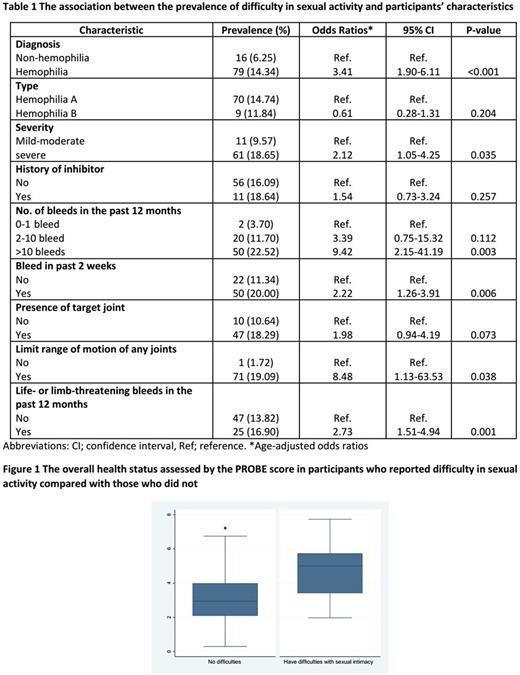Abstract
Background: Sexual health in patients with hemophilia (PWH) is inadequately assessed in the routine care. A small survey study in 20 PWH demonstrated that joint stiffness affected their sexual life (53%), patients had joint pain from sexual activity (53%) and patients did not have adequate information regarding sexual activity (Tobase PM et al. Hemophilia 2017). The aim of this study was to evaluate the impact of hemophilia on sexual health in PWH.
Methods: The PROBE is a 29-item questionnaire evaluating patient reported outcome in hemophilia. The rationale, development and feasibility of the PROBE was reported previously (Skinner M et al. 2016). We recruited PWH and participants without bleeding disorder in 6 countries. The sexual health was assessed using the question asking whether participants have difficulty with sexual intimacy (yes or no). The logistic regression analysis was used to assessed the association between clinical characteristics and sexual health. The overall health status (PROBE score) was assessed among patients with sexual health problem versus those without.
Results: There were 807 respondents (475 had hemophilia A, 76 had hemophilia B and 256 people without bleeding disorder). Median age was 33 years in hemophilia group and 43 years in people without bleeding disorder. Seventy-six percent were male. There was significant greater proportion of people reported difficulty with sexual intimacy among PWH (14.3%) as compared to control (6.25%). Table 1 demonstrated the association between type and severity of hemophilia, bleeding history and joint status and difficulty in sexual intimacy. Patients who bled more than 10 times in the past year, who bled in the past two weeks, who had limit range of motion of any joints and life- or limb-threatening bleeding in the past year were significantly associated with difficulty in sexual intimacy. Multivariate logistic regression revealed that older age, >10 bleeds or life/limb-threatening bleeds in the past year were independent predictors for poor sexual health. Patients who reported difficulty in sexual intimacy has significantly higher total PROBE score, indicating worse general health status comparing to those who did not report (mean score (SD), 4.70 (0.22) vs 3.07 (0.09), P<0.001, Figure 1).
Conclusions: The prevalence of difficulty with sexual activity is significantly higher among PWH as compared to general population. Older age, joint bleeding and joint status are related to poor sexual health in PWH. In addition, poor sexual health is strongly associated with worse general health status. Sexual health should be assessed as a routine care in adult PWH.
Skinner: Baxalta, now part of Shire; Bayer; Bioverativ; CSL; Novo Nordisk, Roche and Sobi with administrative support provided by the US National Hemophilia Foundation: Research Funding; Baxalta, now part of Shire; Bayer; Bioverativ; CSL; Novo Nordisk, Roche and Sobi with administrative support provided by the US National Hemophilia Foundation: Research Funding; US National Hemophilia Foundation: Other: non-financial support ; US National Hemophilia Foundation: Other: non-financial support . Curtis: Pfizer: Research Funding; Genentech: Honoraria, Research Funding; Baxter: Research Funding; Bayer: Research Funding, Speakers Bureau; Bioverativ: Research Funding; CSL Behring: Research Funding; Gilead: Honoraria; Novo Nordisk: Honoraria, Research Funding. Nichol: Bayer: Research Funding; CSL Behring: Research Funding; Baxter: Research Funding; Pfizer: Research Funding; Genentech: Research Funding; Merck: Consultancy; Bioverativ: Consultancy, Research Funding; Novo Nordisk: Research Funding. Noone: Baxalta, now part of Shire; Bayer; Bioverativ; CSL; Novo Nordisk, Roche and Sobi with administrative support provided by the US National Hemophilia Foundation: Research Funding. O'Mahony: US National Hemophilia Foundation: Other: non-financial support.
Author notes
Asterisk with author names denotes non-ASH members.


This feature is available to Subscribers Only
Sign In or Create an Account Close Modal